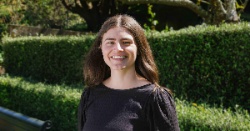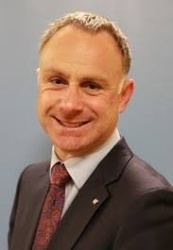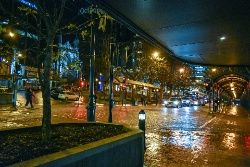Key Nominates Helen Clark for UN Secretary-General
Prime Minister John Key Nominates Helen Clark for UN Secretary-General
New Zealand’s Prime Minister John Key has nominated Helen Clark for the position of UN Secretary-General.
Gerard van Bohemen: I’m Gerard van Bohemen and I am the New Zealand Ambassador. Welcome to the New Zealand Mission. The New Zealand Government is holding a press conference tonight at two ends of the world. A short time ago, the New Zealand Prime Minister John Key announced in Wellington that our government is putting forward Helen Clark for the position of Secretary-General of the United Nations. The Prime Minister’s letter of nomination has just been sent to the President of the General Assembly and the President of the Security Council. The Prime Minister’s Press Release and the Prime Minister’s Letter of Nomination is in your pack. We’re happy to make available what he said in detail in Wellington.
It’s important that I however reiterate the key messages from the Prime Minister. These are that the world and the United Nations are facing significant challenges. The United Nations needs a proven leader who is pragmatic and effective. It’s time for the United Nations to elect the best person for the job. That person is Helen Clark.
Helen Clark: Well thank you Ambassador and as the Ambassador just said in the last few minutes, the New Zealand Prime Minister John Key in Wellington has announced the New Zealand Government is nominating me for the position of United Nations Secretary-General and I’m very, very honoured to receive the full backing of the New Zealand Government and by all the correspondence and traffic coming in, enormous support from the people of New Zealand.
New Zealand is a
Pacific nation of great diversity, situated in a region of
great diversity. New Zealanders have developed over time,
our own way of getting along with each other and getting
things done. The tradition of being tolerant, pragmatic and
fair is part of who we are.
I’m running for Secretary-General because I believe that with this background, I can offer the style of leadership which is needed today. And which will help the United Nations meet the very serious challenges which lie ahead.
As one of the longest serving Prime Ministers of New Zealand, and now having been Leader of UNDP and Chair of the UN Development Group these past seven years, I believe I am the right person for the job.
New Zealand as this Pacific nation has a proud history of support for the United Nations, right from the very beginning of the drafting of the Charter. We need a UN which is up to the task of tackling the major challenges facing our world today and I believe I am the leader that is up to the task of leading the organisation. I want to do it because I am deeply committed to the ideals of the UN Charter and have supported it my whole adult life.
At its best, the position of UN Secretary-General is about giving a voice for the world’s seven billion plus people who look to the UN for hope and support and inspiration. I do intend to run an accessible campaign and I look forward to engaging with the General Assembly next week and with the broader public in the weeks ahead. I will obviously be talking in more detail about the vision that I have for the organisation and my priorities in the coming period which I anticipate will be for quite some months.
Thank you for coming and I will look forward to your questions after a brief New Zealand interlude.
[New Zealand Permanent Mission staff sing waiata]
Thank you so much. Michelle Nichols from Reuters. Could you tell us a little bit more about why you decided to make the decision to run for Secretary-General and how do hope to convince countries like Russia who think that the next Secretary-General should come from Eastern Europe?
I decided to run having received the full backing of the New Zealand Government, because I believe I have the skills for the job. It is an extremely challenging position but I’m used to that. My whole adult life has seen me progressively stepping up to leadership challenges including to those in my own country and then here at the United Nations, heading the development system these past seven years. When nominations were called for from Member States, they were called for from all Member States. Already one senior representative from outside Eastern Europe has nominated. I anticipate there will be other nominations. I judge it to be an open contest and my hope is that Member States will look at what are the challenges that the Secretary-General’s going to have to lead the organisation forward on and who has the best skills for that job.
Thank you. Sherwin Bryce with South African Broadcasting. What do you think is and it’s a very broad question, what do you think is wrong with the United Nations and how do you foresee yourself as Secretary-General implementing changes to right the ship as it were?
I don’t set myself up as a candidate saying what’s wrong with it. I say what’s right with it and what could be built on. The Charter in 1945 was a visionary document. But some of the challenges which the world faces today were not even envisaged in 1945. We had a Charter that set out ambitions on peace and security coming out of World War Two where wars between nations had been devastating. With few exceptions, the world has found a way to deal with conflicts between nations, but we face so many conflicts. Very different in nature, many civil wars, many disparate non-state actors, violent extremists. I think this calls for new and joined up approaches within the United Nations. The United Nations has many tools in its tool kit. They all need to be utilised to try to build the more peaceful and inclusive societies envisaged in Agenda 2030. Societies which mediate and talk through their differences, rather than having to fight them out. So I do see peace and security as a major priority. I’ve been involved in these issues also my whole life. I see peace and security being built on the foundations of inclusive and sustainable development. I see the United Nations needing to be proactive in the way it approaches promoting the ideals of the Charter in the 21st Century and it needs to be organisationally effective in doing that.
Hi there, James Randall Al Jazeera, thanks so much for the briefing and the music. Part of the reason for this new process for the selection of an SG is because they’re trying to take power away from the enormous influence the P5 have within the organisation. What can you say today about you if you get the job as Secretary-General, how you won’t be beholden to such a great extent to the big powers, to Russia, America and China?
Well we have many Member States and we have five Permanent Members of a Security Council. The Secretary-General has a responsibility to the key organs of the organisations. One of those is the Security Council, one is the General Assembly and a third is the Economic and Social Council. These are the major organs. I would see myself obviously as very responsive to Member States, looking to reconcile differences, looking to be a convener, looking to bring people together. My background and experience in leadership has been in bringing diverse peoples together. I could add in this respect that for nine years as Prime Minister, I always ran minority governments. I know from my personal experience how to build coalitions around issues and seek a consensus on what must be done. So those are the skills that I bring to it. I fully acknowledge the importance of the P5, I acknowledge the importance of every member state in the community of nations.
Thank you Ms Clark, Jack Tame from Television New Zealand. I just wondered as Secretary-General, are there specific areas or issues or conflicts to which you would give the most priority, the highest priority?
Well we’re standing here at the beginning of April in 2016 and we see world events move very, very fast. There may be issues emerging we haven’t even foreseen today. What I would love to see if I were able to enter the office of Secretary-General on the 1st of January, would be a political and peace process underway in Syria, because it’s been waiting for a long time. But perhaps to use that example, I do believe that the good offices of the Secretary-General, the proactive work through Special Envoys, the seeking to bring people together no matter how intractable the disputes seem has to be a huge priority for the leader of the organisation.
My name is Ryohei Takagi, Japanese media. Do you think the next Secretary-General should be a woman?
I am seeking the position because I believe I am the best person for the job. Obviously, I am a woman, but I’ve never sought election on the basis of being a woman. I’ve always sought election, and I’ve sought election many times in my life, as the best person for the job. In the normal course of events, I like advocates of gender equality and women’s empowerment around the world, would like to see women have a fair chance, an equal chance at every position of responsibility. That applies to the United Nations as it applies to governments, as it applies to leadership positions in general.
Bingxin Li from People's Daily in China. I know that you reiterated that you’re qualified to be the next leader of the UN. If you were elected, how do you push forward the Security Council reform? Thank you.
The Security Council reform lies in the hands of Member States. The role of the Secretariat is to respond with whatever technical information, possibly offer ways of dealing with it, but Member States in the end will decide the composition. When I was Prime Minister of my country, there was a point at which this was a very live issue and obviously I worked with my ministers on what contribution my own country might make to that debate. I hope the debate will fire up again because in principle it’s desirable for the Security Council to reflect the geopolitical realities of the 21st Century and not of 1945. Things have moved on.
Somini Sengupta, New York Times: Ms Clark, who are you meeting with this week and in New York and do you have meetings confirmed with all the Permanent Members of the Security Council?
My process from here is that I have not sought to set up meetings prior to this announcement. And actually at midnight tonight, I intend to honour a commitment to go to Cairo and speak at a major Arab League and Government of Egypt hosted meeting on the Sustainable Development Goals. I will be back on Thursday and then working with the Permanent Mission. We will start putting in place our programme of calls and I would like to have some done prior to the General Assembly sessions next week which I hope to be included in. So it will evolve from here.
Ms Clark, I’m Margaret Besheer with the Voice of America. You’re the only current active UN official who’s seeking the post of Secretary-General. Do you think that’s any sort of conflict of interest to be in a senior level post while you’re seeking your boss’s job so to speak?
No. And there is also another candidate who heads a major UN organisation. That is Irina Bokova of UNESCO. My understanding is that she, like I, are making a very clear demarcation between respective responsibilities. So obviously I’ve taken ethics advice on this, and there will be no UNDP resources spent on my campaign. This campaign will be funded by the New Zealand Government and I will take the leave required to do that. I do have responsibilities to UNDP which I will be discharging. But you can be assured that I am extremely mindful of responsibilities in this regard.
Thank
you.
[ENDS]


 Gordon Campbell: On ACT’s Charter Schools Experiment
Gordon Campbell: On ACT’s Charter Schools Experiment NZ Government: Christopher Luxon - Pre-Budget Speech To Auckland Business Chamber
NZ Government: Christopher Luxon - Pre-Budget Speech To Auckland Business Chamber Government: New Zealand Supports UN Palestine Resolution
Government: New Zealand Supports UN Palestine Resolution Green Party: Greens Welcome Cross-party Approach To Climate Adaptation
Green Party: Greens Welcome Cross-party Approach To Climate Adaptation Government: Climate Change – Mitigating The Risks And Costs
Government: Climate Change – Mitigating The Risks And Costs Greenpeace: Protest March Against Fast-track Bill Announced For Auckland
Greenpeace: Protest March Against Fast-track Bill Announced For Auckland Wellington Office of the Mayor: Mayor Responds To Housing Minister’s District Plan Decision
Wellington Office of the Mayor: Mayor Responds To Housing Minister’s District Plan Decision


